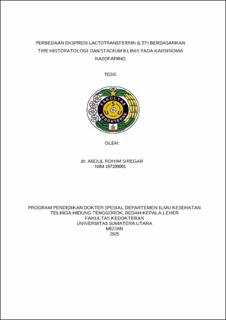Perbedaan Ekspresi Lactotransferrin (Ltf) Berdasarkan Tipe Histopatologi dan Stadium Klinis pada Karsinoma Nasofaring
Differences in Lactotransferrin (Ltf) Expression by Histopathological Type and Clinical Stage in Nasopharyngeal Carcinoma

Date
2025Author
Siregar, Abdul Rohim
Advisor(s)
Farhat
Rambe, Andrina Yunita Murni
Metadata
Show full item recordAbstract
Introduction: Nasopharyngeal carcinoma (NPC) is the most common malignancy found in the Rosenmüller fossa. Lactotransferrin (LTF) is an iron-binding glycoprotein produced by mucosal epithelial cells. LTF plays various roles, including iron homeostasis, antimicrobial effects, immunomodulation, and tumor suppression. Objective: This study aims to evaluate differences in lactotransferrin expression based on histopathological type and clinical staging in nasopharyngeal carcinoma. Methods: This study was an observational analytical study with a cross-sectional design using paraffin-embedded tissue blocks from NPC patients. LTF expression was assessed using RT-PCR. Results: A total of 31 subjects participated in this study, consisting of 21 males (67.7%) and 10 females (32.3%), with a mean age of 45.39 years. Significant differences in LTF expression were observed based on tumor extension (p = 0.037), lymph node enlargement (p = 0.038), and clinical staging (p = 0.038), with decreasing LTF expression corresponding to increased tumor extension, lymph node enlargement, and clinical stage. However, no significant difference was found in LTF expression based on histopathological type (p = 0.380), although LTF expression tended to be lower in non-keratinizing squamous cell carcinoma (SCC) compared to undifferentiated carcinoma. Conclusion: This study demonstrates a significant association between decreased LTF expression and tumor extension, lymph node enlargement, and clinical staging. However, no significant difference was found in LTF expression based on histopathological type. The reduction in LTF expression in cases with greater tumor extension, lymph node enlargement, and higher clinical stages highlights LTF’s role in inhibiting tumor growth and metastasis, suggesting its potential as a prognostic biomarker and therapeutic target.
Collections
- Master Theses [204]
